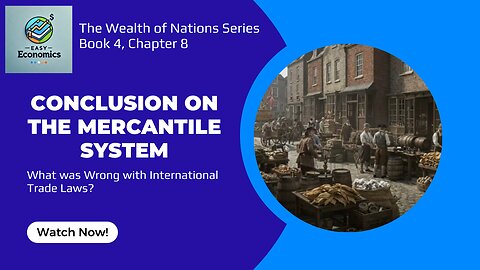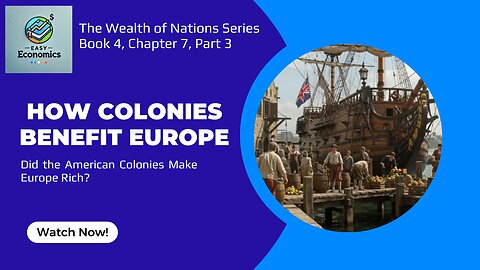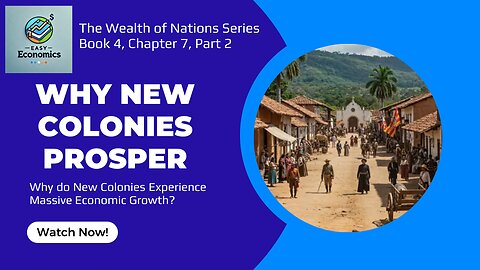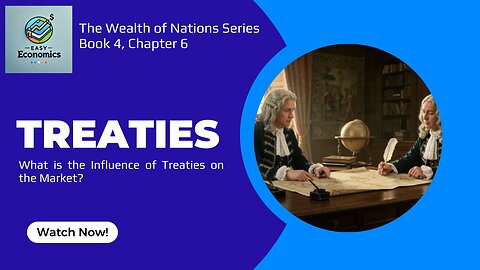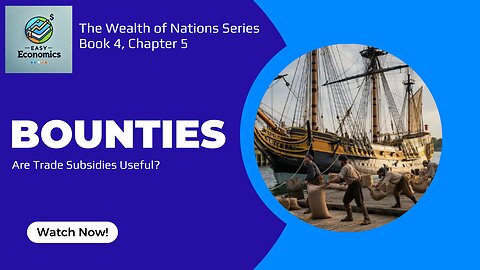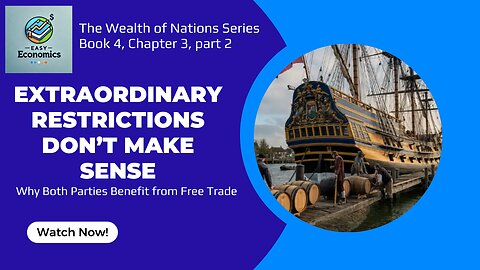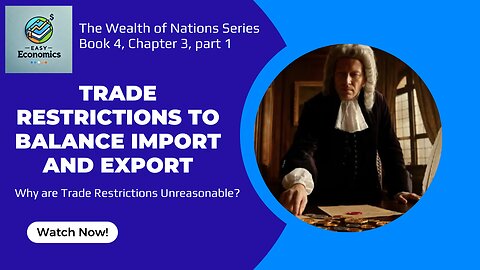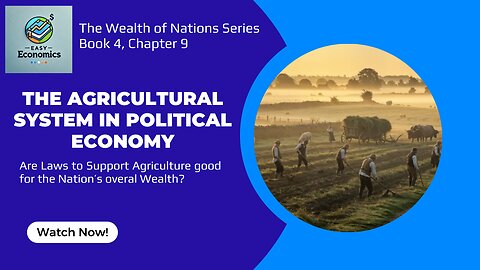
The Wealth of Nations Book 4
12 videos
Updated 11 months ago
The Role of Government and the Impact of Commerce
In this playlist, we dive into Book 4 of Adam Smith's The Wealth of Nations, where he explores the essential role of government in regulating trade and commerce. Smith examines the dynamics between national policies, international trade, and the consequences of mercantilism. This section is foundational in understanding the importance of free markets, how governments should intervene (or not), and the broader effects of commerce on wealth and prosperity. We’ll break down key ideas like the dangers of monopolies, the benefits of competition, and the role of tariffs and subsidies in shaping economies. Perfect for those looking to understand the intersection of economics and government policy in the development of nations.
-
The Wealth of Nations Book 4 Chapter 9 - Systems in Political Economy
 EasyEconomicsGet the original book: https://amzn.to/3W5xeku Did agriculture really create all wealth, as the Physiocrats believed? In this video, we explore the economic system that placed farming at the center of national prosperity. From France’s mercantilist policies under Colbert to François Quesnay’s revolutionary Economic Table, we examine how land, labor, and trade were viewed by 18th-century economists. Did trade and manufacturing merely sustain themselves without adding value? And how did these ideas shape economic policies in France, China, and even Ancient Egypt? More importantly, what can we learn from this debate today? Discover why free trade benefits agriculture, how restricting industry harms farming, and why national wealth depends on more than just land. If you've ever wondered about the true sources of economic growth, this is the video for you. Questions Answered in the Video: Why did some economists believe only agriculture created wealth? How did France’s policies under Colbert impact agriculture? What was François Quesnay’s Economic Table? Why were merchants and manufacturers labeled “unproductive”? How did agricultural and commercial nations differ in economic strategies? What role did free trade play in the growth of manufacturing? How did China, Egypt, and India favor agriculture over industry? Why did Greek and Roman restrictions on trade weaken their economies? How does economic freedom naturally promote wealth? What is the government’s proper role in economic development? 00:00 - Introduction to Agricultural Systems in Political Economy 00:12 - The Flaws of Agriculture 01:05 - The Three Classes of Workers 01:57 - Artisans and Merchants 03:19 - The Role of Merchants 04:22 - Trade Focused States 05:50 - Free Trade 06:42 - French Economist 07:34 - Economic Policy 08:40 - Artisans and Merchants 09:49 - Economic Growth 10:52 - Manufacturing Nations 11:42 - The Agricultural System 12:42 - Europe vs Other Nations 13:28 - Ancient Egypt and India 14:17 - Manufacturing 15:50 - Cities and Countryside 16:45 - Economic Freedom 17:30 - Outro Hashtags: #AgriculturalEconomics #FreeTrade #EconomicTheory12 views 1 comment
EasyEconomicsGet the original book: https://amzn.to/3W5xeku Did agriculture really create all wealth, as the Physiocrats believed? In this video, we explore the economic system that placed farming at the center of national prosperity. From France’s mercantilist policies under Colbert to François Quesnay’s revolutionary Economic Table, we examine how land, labor, and trade were viewed by 18th-century economists. Did trade and manufacturing merely sustain themselves without adding value? And how did these ideas shape economic policies in France, China, and even Ancient Egypt? More importantly, what can we learn from this debate today? Discover why free trade benefits agriculture, how restricting industry harms farming, and why national wealth depends on more than just land. If you've ever wondered about the true sources of economic growth, this is the video for you. Questions Answered in the Video: Why did some economists believe only agriculture created wealth? How did France’s policies under Colbert impact agriculture? What was François Quesnay’s Economic Table? Why were merchants and manufacturers labeled “unproductive”? How did agricultural and commercial nations differ in economic strategies? What role did free trade play in the growth of manufacturing? How did China, Egypt, and India favor agriculture over industry? Why did Greek and Roman restrictions on trade weaken their economies? How does economic freedom naturally promote wealth? What is the government’s proper role in economic development? 00:00 - Introduction to Agricultural Systems in Political Economy 00:12 - The Flaws of Agriculture 01:05 - The Three Classes of Workers 01:57 - Artisans and Merchants 03:19 - The Role of Merchants 04:22 - Trade Focused States 05:50 - Free Trade 06:42 - French Economist 07:34 - Economic Policy 08:40 - Artisans and Merchants 09:49 - Economic Growth 10:52 - Manufacturing Nations 11:42 - The Agricultural System 12:42 - Europe vs Other Nations 13:28 - Ancient Egypt and India 14:17 - Manufacturing 15:50 - Cities and Countryside 16:45 - Economic Freedom 17:30 - Outro Hashtags: #AgriculturalEconomics #FreeTrade #EconomicTheory12 views 1 comment -
The Wealth of Nations Book 4 Chapter 8 - The Mercantile System's Hidden Flaws
 EasyEconomicsGet the original book: https://amzn.to/3W5xeku The mercantile system was designed to make nations wealthy by promoting exports and restricting imports, but in practice, it often had the opposite effect. Britain, for example, imposed severe restrictions on wool exports, benefiting manufacturers at the expense of farmers. Harsh penalties, including exile and even execution, were enacted to prevent smuggling, yet illegal trade flourished. The system also banned the export of critical resources like metals and manufacturing tools to limit foreign competition. Skilled workers were even prohibited from leaving the country to prevent industrial knowledge from spreading abroad. The system ultimately prioritized producers over consumers, forcing people to buy more expensive goods while manufacturers reaped the benefits. Britain’s colonial policies further reinforced this by treating colonies as captive markets. The result was higher costs for ordinary citizens, rising national debt, and widespread inefficiencies. This video examines the flaws of the mercantile system and how it shaped global trade. Questions Answered in the Video: What was the main goal of the mercantile system? How did Britain restrict trade to protect its industries? Why were wool exports banned, and what were the consequences? How did trade restrictions lead to smuggling? What role did colonies play in the mercantile system? Why were skilled workers prevented from leaving Britain? How did the mercantile system impact consumers? Did the system actually make Britain wealthier? How did trade policies contribute to Britain’s national debt? What lessons can be learned from the failures of the mercantile system? 00:00 - Introduction to The Conclusion of the Mercantile System. 00:13 - Aims of the Mercantile System 00:47 - Britain’s Policies 01:22- Restrictions on Wool Exports 01:58 - Contradictions and Consequences 02:39 - Penalties for Wool Export 03:00 - Regulations on Domestic Wool Trade 03:23 - Justification and Reality of Wool Industry 03:45 - Impact on Wool and Meat Prices 04:06 - Taxing Wool Exports 04:34 - Other Export Restrictions 04:58 - Impact of Laws 05:11 - Historical Laws on Metal Exports 05:39 - Dyes and Gum Senega 06:12 - Beaver Skins and Coal 06:32 - Restrictions on Manufacturing Tools and Skilled Workers 07:01 - Prioritizing Producers 07:28 - Colonial System 07:53 - Beneficiaries of the System 08:18 - Conclusion #Mercantilism #TradeHistory #EconomicPolicy13 views
EasyEconomicsGet the original book: https://amzn.to/3W5xeku The mercantile system was designed to make nations wealthy by promoting exports and restricting imports, but in practice, it often had the opposite effect. Britain, for example, imposed severe restrictions on wool exports, benefiting manufacturers at the expense of farmers. Harsh penalties, including exile and even execution, were enacted to prevent smuggling, yet illegal trade flourished. The system also banned the export of critical resources like metals and manufacturing tools to limit foreign competition. Skilled workers were even prohibited from leaving the country to prevent industrial knowledge from spreading abroad. The system ultimately prioritized producers over consumers, forcing people to buy more expensive goods while manufacturers reaped the benefits. Britain’s colonial policies further reinforced this by treating colonies as captive markets. The result was higher costs for ordinary citizens, rising national debt, and widespread inefficiencies. This video examines the flaws of the mercantile system and how it shaped global trade. Questions Answered in the Video: What was the main goal of the mercantile system? How did Britain restrict trade to protect its industries? Why were wool exports banned, and what were the consequences? How did trade restrictions lead to smuggling? What role did colonies play in the mercantile system? Why were skilled workers prevented from leaving Britain? How did the mercantile system impact consumers? Did the system actually make Britain wealthier? How did trade policies contribute to Britain’s national debt? What lessons can be learned from the failures of the mercantile system? 00:00 - Introduction to The Conclusion of the Mercantile System. 00:13 - Aims of the Mercantile System 00:47 - Britain’s Policies 01:22- Restrictions on Wool Exports 01:58 - Contradictions and Consequences 02:39 - Penalties for Wool Export 03:00 - Regulations on Domestic Wool Trade 03:23 - Justification and Reality of Wool Industry 03:45 - Impact on Wool and Meat Prices 04:06 - Taxing Wool Exports 04:34 - Other Export Restrictions 04:58 - Impact of Laws 05:11 - Historical Laws on Metal Exports 05:39 - Dyes and Gum Senega 06:12 - Beaver Skins and Coal 06:32 - Restrictions on Manufacturing Tools and Skilled Workers 07:01 - Prioritizing Producers 07:28 - Colonial System 07:53 - Beneficiaries of the System 08:18 - Conclusion #Mercantilism #TradeHistory #EconomicPolicy13 views -
The Wealth of Nations Book 4 Chapter 7 Part 3 - How Europe Benefits from American Colonies
 EasyEconomicsGet the original book: https://amzn.to/3W5xeku This content explores the economic consequences of monopolistic practices in the context of colonial trade, particularly focusing on the British and Dutch East India Companies. It critiques the idea that monopolies increase national wealth, instead arguing that they often reduce long-term capital accumulation and encourage wasteful spending. By examining historical examples from cities like Cadiz, Lisbon, and Amsterdam, it shows that high profits, when driven by monopolistic control, can harm broader economic growth. In these examples, monopolies encourage luxury spending over productive investments, limiting wealth creation in the long run. The piece also delves into the detrimental effects of monopolies on colonies, using Britain’s control over American trade as a case study. Despite increasing profits for merchants, the monopoly system drained British resources, especially in terms of defense costs and military engagement, ultimately hurting the empire’s economy. Moreover, it argues that a free trade system, where colonies and trading partners have more autonomy, could foster greater mutual prosperity. Monopolistic practices, especially in managing international trade, limit the natural flow of capital and restrict economic expansion. By drawing on examples from the Portuguese and Dutch trading systems, the text suggests that countries can thrive without the constraints of exclusive trade companies, promoting a more decentralized and efficient model of commerce. 00:00 - Introduction to the Benefits from Discovering America and the Passage to the East Indies 00:15 - General Benefits 01:42 - Specific Benefits 03:16 - Trade Monopolies 04:07 - Navigation Act 05:40 - Naval Power 06:45 - Economic Impact 07:42 - Capital Efficiency 08:38 - Trade Balance 09:43 - Economic Security 10:34 - Broader Economic Impact 11:45 - Economic Policies 12:36 - Land Improvement 13:21 - Mercantile Profit 14:18 - Comparative Analysis 14:57 - Economic Impact 15:57 - Free Trade 16:56 - Economic Balance 17:59 - Taxation 18:47 - Representation 19:55 - American Representation 20:43 - Economic Growth 21:59 - Trade Monopolies 22:53 - Economic Distribution 23:44 - Exclusive Companies 24:49 - Trade Efficiency 25:51 - Historical Trade Practices 26:51 - Trade Practices 28:07 - Trade Regulations 29:12 - Economic Impact 29:52 - Conclusion #MonopolyEconomics #ColonialTrade #FreeTrade26 views 1 comment
EasyEconomicsGet the original book: https://amzn.to/3W5xeku This content explores the economic consequences of monopolistic practices in the context of colonial trade, particularly focusing on the British and Dutch East India Companies. It critiques the idea that monopolies increase national wealth, instead arguing that they often reduce long-term capital accumulation and encourage wasteful spending. By examining historical examples from cities like Cadiz, Lisbon, and Amsterdam, it shows that high profits, when driven by monopolistic control, can harm broader economic growth. In these examples, monopolies encourage luxury spending over productive investments, limiting wealth creation in the long run. The piece also delves into the detrimental effects of monopolies on colonies, using Britain’s control over American trade as a case study. Despite increasing profits for merchants, the monopoly system drained British resources, especially in terms of defense costs and military engagement, ultimately hurting the empire’s economy. Moreover, it argues that a free trade system, where colonies and trading partners have more autonomy, could foster greater mutual prosperity. Monopolistic practices, especially in managing international trade, limit the natural flow of capital and restrict economic expansion. By drawing on examples from the Portuguese and Dutch trading systems, the text suggests that countries can thrive without the constraints of exclusive trade companies, promoting a more decentralized and efficient model of commerce. 00:00 - Introduction to the Benefits from Discovering America and the Passage to the East Indies 00:15 - General Benefits 01:42 - Specific Benefits 03:16 - Trade Monopolies 04:07 - Navigation Act 05:40 - Naval Power 06:45 - Economic Impact 07:42 - Capital Efficiency 08:38 - Trade Balance 09:43 - Economic Security 10:34 - Broader Economic Impact 11:45 - Economic Policies 12:36 - Land Improvement 13:21 - Mercantile Profit 14:18 - Comparative Analysis 14:57 - Economic Impact 15:57 - Free Trade 16:56 - Economic Balance 17:59 - Taxation 18:47 - Representation 19:55 - American Representation 20:43 - Economic Growth 21:59 - Trade Monopolies 22:53 - Economic Distribution 23:44 - Exclusive Companies 24:49 - Trade Efficiency 25:51 - Historical Trade Practices 26:51 - Trade Practices 28:07 - Trade Regulations 29:12 - Economic Impact 29:52 - Conclusion #MonopolyEconomics #ColonialTrade #FreeTrade26 views 1 comment -
The Wealth of Nations Book 4 Chapter 7 Part 2 - Why New Colonies Prosper
 EasyEconomicsGet the original book: https://amzn.to/3W5xeku In this video, we explore the factors that contributed to the rapid prosperity of European colonies, focusing on how settlers brought advanced farming, governance, and legal systems to newly settled lands. Colonies, particularly those in the Americas, experienced rapid growth, fueled by abundant land, high wages, and a favorable political environment. Unlike other European powers, England's policies allowed its colonies more freedom, encouraging population growth and economic development. However, restrictions on trade and industry hindered long-term prosperity. We also examine the role of slavery in these colonies and compare the differing approaches to governance and labor management between the French, Spanish, and English colonies. While European powers sought to control resources and monopolize trade, it was often the bold actions of individual settlers and entrepreneurs that led to the true success of these colonies, paving the way for the modern nations we see today. 00:00 - Intro to Why New Colonies Prosper 00:13 - Causes of Prosperity in New Colonies 01:55 - Comparison of Ancient Greek and Roman Colonies 02:36 - European Colonies in the Americas 02:56 - Spanish and Portuguese Colonies 03:32 - Brazil’s Growth and Defense 03:50 - Naval Powers and Colonization 04:18 - Swedish and Danish Colonies 04:40 - Dutch Colonies 04:57 - French Colonies in Canada and St. Domingo 05:30 - English Colonies in North America 05:54 - Land Laws and Inheritance in English Colonies 06:39 - Labor and Taxation in English Colonies 07:26 - Trade Policies and Market Access 08:12 - Impact of Trade Regulations 09:00 - Enumerated and Non-Enumerated Goods 09:49 - Timber and Pig Iron Regulations 10:34 - Manufacturing Restrictions 10:56 - Economic Conditions Despite Restrictions 12:13 - Colonial Assemblies and Governance 13:02 - Comparison of Government Systems 13:36 - French and English Colonial Policies 14:03 - Slavery in Different Colonies 15:28 - Impact of Individual Actions 15:50 - European Control and Colonial Trade 16:09 - Legacy of Colonial Founders 16:28 - Conclusion #ColonialProsperity #EuropeanColonies #TradeAndSlavery11 views
EasyEconomicsGet the original book: https://amzn.to/3W5xeku In this video, we explore the factors that contributed to the rapid prosperity of European colonies, focusing on how settlers brought advanced farming, governance, and legal systems to newly settled lands. Colonies, particularly those in the Americas, experienced rapid growth, fueled by abundant land, high wages, and a favorable political environment. Unlike other European powers, England's policies allowed its colonies more freedom, encouraging population growth and economic development. However, restrictions on trade and industry hindered long-term prosperity. We also examine the role of slavery in these colonies and compare the differing approaches to governance and labor management between the French, Spanish, and English colonies. While European powers sought to control resources and monopolize trade, it was often the bold actions of individual settlers and entrepreneurs that led to the true success of these colonies, paving the way for the modern nations we see today. 00:00 - Intro to Why New Colonies Prosper 00:13 - Causes of Prosperity in New Colonies 01:55 - Comparison of Ancient Greek and Roman Colonies 02:36 - European Colonies in the Americas 02:56 - Spanish and Portuguese Colonies 03:32 - Brazil’s Growth and Defense 03:50 - Naval Powers and Colonization 04:18 - Swedish and Danish Colonies 04:40 - Dutch Colonies 04:57 - French Colonies in Canada and St. Domingo 05:30 - English Colonies in North America 05:54 - Land Laws and Inheritance in English Colonies 06:39 - Labor and Taxation in English Colonies 07:26 - Trade Policies and Market Access 08:12 - Impact of Trade Regulations 09:00 - Enumerated and Non-Enumerated Goods 09:49 - Timber and Pig Iron Regulations 10:34 - Manufacturing Restrictions 10:56 - Economic Conditions Despite Restrictions 12:13 - Colonial Assemblies and Governance 13:02 - Comparison of Government Systems 13:36 - French and English Colonial Policies 14:03 - Slavery in Different Colonies 15:28 - Impact of Individual Actions 15:50 - European Control and Colonial Trade 16:09 - Legacy of Colonial Founders 16:28 - Conclusion #ColonialProsperity #EuropeanColonies #TradeAndSlavery11 views -
The Wealth of Nations Book 4 Chapter 7 Part 1 - The Motives for Establishing New Colonies
 EasyEconomicsGet the original book: https://amzn.to/3W5xeku In this video, we explore the reasons behind the establishment of European colonies, from ancient Greece and Rome to the Age of Exploration in the Americas. Unlike the necessity-driven colonies of Greece and Rome, early European settlements in the Americas were driven by different, often unclear motives. Columbus's famous discovery in 1492 opened the door to European colonization, but his hope of finding wealth in gold proved to be more challenging than expected. Though Spain enjoyed some success in gold mining, the reality of extracting wealth was far from the initial dreams. We also look at the risks and failures faced by explorers like Cortés and Pizarro, along with the broader consequences of European expansion during this time. Join us as we dive into the complexities and motivations behind the colonization of the New World. 00:00 - Intro to Roman colonies 00:12 - Explanation of early European settlements 00:25 -Ancient Greece colonies explanation 00:59 - Roman colonies explanation 01:46 - European colonies explanation 02:02 - Venetian trade explanation 02:34 - Christopher Columbus explanation 02:58 - Columbus discovery explanation 03:22 - Spanish decision explanation 03:45 - Gold extraction explanation 04:36 - Mining projects explanation 05:02 - Spanish success explanation 05:33- Outro #ColonialHistory #EuropeanExploration #GoldMining23 views 1 comment
EasyEconomicsGet the original book: https://amzn.to/3W5xeku In this video, we explore the reasons behind the establishment of European colonies, from ancient Greece and Rome to the Age of Exploration in the Americas. Unlike the necessity-driven colonies of Greece and Rome, early European settlements in the Americas were driven by different, often unclear motives. Columbus's famous discovery in 1492 opened the door to European colonization, but his hope of finding wealth in gold proved to be more challenging than expected. Though Spain enjoyed some success in gold mining, the reality of extracting wealth was far from the initial dreams. We also look at the risks and failures faced by explorers like Cortés and Pizarro, along with the broader consequences of European expansion during this time. Join us as we dive into the complexities and motivations behind the colonization of the New World. 00:00 - Intro to Roman colonies 00:12 - Explanation of early European settlements 00:25 -Ancient Greece colonies explanation 00:59 - Roman colonies explanation 01:46 - European colonies explanation 02:02 - Venetian trade explanation 02:34 - Christopher Columbus explanation 02:58 - Columbus discovery explanation 03:22 - Spanish decision explanation 03:45 - Gold extraction explanation 04:36 - Mining projects explanation 05:02 - Spanish success explanation 05:33- Outro #ColonialHistory #EuropeanExploration #GoldMining23 views 1 comment -
The Wealth of Nations Book 4 Chapter 6 - The Hidden Cost of Trade Treaties
 EasyEconomicsGet the original book: https://amzn.to/3W5xeku In this video, we examine the economic impact of treaties of commerce, using the 1703 Methuen Treaty between Britain and Portugal as a case study. While such treaties aim to boost exports and secure trade advantages, they often create market distortions, benefiting certain merchants while harming consumers and industries. The Methuen Treaty gave Portugal’s wine producers an advantage in Britain, but at the cost of trade efficiency. We also explore how Britain’s reliance on Portuguese gold was overstated, as gold is just another commodity that can be acquired elsewhere. Additionally, we break down the role of seigniorage—government fees for minting coins—and how Britain’s policy of free coinage contributed to gold coin shortages and economic inefficiencies. The key takeaway: trade agreements that favor one country over others often do more harm than good, and policies focused on money supply rather than productive industry are based on outdated mercantilist thinking. 00:00 - Introduction to Treaties of Commerce 00:11 - Impact of Trade Treaties 00:58 - The Methuen Treaty 01:40 - Gold and Trade Efficiency 03:01 - Britain’s Coinage System 03:44 - Seigniorage and Coinage Policy 06:34 - Conclusion and Broader Economic Implications 07:01 - Get the book #Trade #Economics #AdamSmith6 views
EasyEconomicsGet the original book: https://amzn.to/3W5xeku In this video, we examine the economic impact of treaties of commerce, using the 1703 Methuen Treaty between Britain and Portugal as a case study. While such treaties aim to boost exports and secure trade advantages, they often create market distortions, benefiting certain merchants while harming consumers and industries. The Methuen Treaty gave Portugal’s wine producers an advantage in Britain, but at the cost of trade efficiency. We also explore how Britain’s reliance on Portuguese gold was overstated, as gold is just another commodity that can be acquired elsewhere. Additionally, we break down the role of seigniorage—government fees for minting coins—and how Britain’s policy of free coinage contributed to gold coin shortages and economic inefficiencies. The key takeaway: trade agreements that favor one country over others often do more harm than good, and policies focused on money supply rather than productive industry are based on outdated mercantilist thinking. 00:00 - Introduction to Treaties of Commerce 00:11 - Impact of Trade Treaties 00:58 - The Methuen Treaty 01:40 - Gold and Trade Efficiency 03:01 - Britain’s Coinage System 03:44 - Seigniorage and Coinage Policy 06:34 - Conclusion and Broader Economic Implications 07:01 - Get the book #Trade #Economics #AdamSmith6 views -
The Wealth of Nations Book 4 Chapter 5 - Bounties, The Hidden Cost of Subsidies
 EasyEconomicsGet the original book: https://amzn.to/3W5xeku In this video, we explore the impact of government bounties—subsidies given to merchants and manufacturers to encourage exports. While bounties are meant to boost trade and national wealth, they often create inefficiencies by supporting industries that wouldn’t survive on their own. Using the example of Britain’s corn bounty, we examine how these policies distort market prices, increase food costs, and harm both consumers and workers. We also discuss how export subsidies can shrink domestic markets, limit economic growth, and ultimately make a country less competitive. Additionally, we compare Britain's trade policies to those of Spain and Portugal, showing how restrictive laws on gold and silver exports led to economic stagnation. The video breaks down why free trade and open markets are the best ways to ensure long-term prosperity. Watch to understand why bounties and other government interventions often do more harm than good in global trade and agriculture. 00:00 - Intro about Bounties 00:10 - The Concept of Bounties 00:56 - Economic Impact of Bounties 01:13 - Corn Bounties 01:48 - Bounties and Food Prices 02:07 - Bounties and Domestic vs. Foreign Markets 02:24 - Hidden Costs of Bounties 02:46 - Long-term Effects on Economy 06:40 - Bounties and Agricultural Policies 08:03 - Bounties in Fishing Industry 12:49 - Historical Context and Comparisons 13:31 - Government Interference and Market Efficiency 15:34 - Free Trade vs. Government Restrictions 20:41 - Corn Laws and Economic Principles 21:45 - Recent Reforms and Future Outlook 22:39 - Conclusion21 views
EasyEconomicsGet the original book: https://amzn.to/3W5xeku In this video, we explore the impact of government bounties—subsidies given to merchants and manufacturers to encourage exports. While bounties are meant to boost trade and national wealth, they often create inefficiencies by supporting industries that wouldn’t survive on their own. Using the example of Britain’s corn bounty, we examine how these policies distort market prices, increase food costs, and harm both consumers and workers. We also discuss how export subsidies can shrink domestic markets, limit economic growth, and ultimately make a country less competitive. Additionally, we compare Britain's trade policies to those of Spain and Portugal, showing how restrictive laws on gold and silver exports led to economic stagnation. The video breaks down why free trade and open markets are the best ways to ensure long-term prosperity. Watch to understand why bounties and other government interventions often do more harm than good in global trade and agriculture. 00:00 - Intro about Bounties 00:10 - The Concept of Bounties 00:56 - Economic Impact of Bounties 01:13 - Corn Bounties 01:48 - Bounties and Food Prices 02:07 - Bounties and Domestic vs. Foreign Markets 02:24 - Hidden Costs of Bounties 02:46 - Long-term Effects on Economy 06:40 - Bounties and Agricultural Policies 08:03 - Bounties in Fishing Industry 12:49 - Historical Context and Comparisons 13:31 - Government Interference and Market Efficiency 15:34 - Free Trade vs. Government Restrictions 20:41 - Corn Laws and Economic Principles 21:45 - Recent Reforms and Future Outlook 22:39 - Conclusion21 views -
The Wealth of Nations Book 4 Chapter 4 - Understanding Drawbacks in International Trade
 EasyEconomicsGet the original book: https://amzn.to/3W5xeku In this video, we dive into the concept of "drawbacks" and how they impact international trade. Merchants and manufacturers often seek government support to expand sales beyond their home markets, and drawbacks—refunds on import duties for goods that are exported—are one way the government offers this support. While drawbacks prevent excessive duties from hindering natural exports, they don’t necessarily boost trade volumes. In fact, drawbacks simply ensure that duties don’t discourage exports that would’ve happened anyway. The video explores how this mechanism works, why certain goods like French imports faced restrictions, and the potential for drawbacks to either support or distort trade. While drawbacks help keep markets open and balance industries, they aren’t without flaws—particularly when it comes to misuse or fraud. Learn how drawbacks have shaped economic policy and trade between nations, particularly when it comes to carrying trade and colonial monopolies. 00:00 - Introduction to Drawbacks 00:11- Merchants and Government Support 00:26 - Mechanics of Drawbacks 00:50 - Re-exportation of Foreign Goods 01:13 - Restrictions and Trade Competition 01:36 - Encouraging Carrying Trade 02:20 - Impact on Customs Revenue 02:52 - Drawbacks and Colonial Trade 03:13 - Misuse and Fraud 03:33 - Conclusion5 views
EasyEconomicsGet the original book: https://amzn.to/3W5xeku In this video, we dive into the concept of "drawbacks" and how they impact international trade. Merchants and manufacturers often seek government support to expand sales beyond their home markets, and drawbacks—refunds on import duties for goods that are exported—are one way the government offers this support. While drawbacks prevent excessive duties from hindering natural exports, they don’t necessarily boost trade volumes. In fact, drawbacks simply ensure that duties don’t discourage exports that would’ve happened anyway. The video explores how this mechanism works, why certain goods like French imports faced restrictions, and the potential for drawbacks to either support or distort trade. While drawbacks help keep markets open and balance industries, they aren’t without flaws—particularly when it comes to misuse or fraud. Learn how drawbacks have shaped economic policy and trade between nations, particularly when it comes to carrying trade and colonial monopolies. 00:00 - Introduction to Drawbacks 00:11- Merchants and Government Support 00:26 - Mechanics of Drawbacks 00:50 - Re-exportation of Foreign Goods 01:13 - Restrictions and Trade Competition 01:36 - Encouraging Carrying Trade 02:20 - Impact on Customs Revenue 02:52 - Drawbacks and Colonial Trade 03:13 - Misuse and Fraud 03:33 - Conclusion5 views -
The Wealth of Nations Book 4 Chapter 3 Part 2 - Why Extraordinary Restrictions Don't Make Sense
 EasyEconomicsGet the original book: https://amzn.to/3W5xeku In this video, we explore why the concept of the "balance of trade" is flawed and how imposing strict import restrictions can harm economies. Using the historical trade relations between England and France as an example, we examine how trade imbalances, often seen as a disadvantage, are not inherently negative. The idea that one nation benefits while the other loses from trade is misleading. Instead, trade benefits both countries by creating markets for surplus goods and supporting employment. We also discuss how national prejudices and monopolistic interests have shaped trade policies, often to the detriment of the public. By embracing free trade and removing unnecessary restrictions, nations can create more opportunities for economic growth, benefiting not only themselves but their trading partners as well. This video challenges the conventional wisdom about trade imbalances and advocates for more open, cooperative trade relations. 00:00 - Introduction why Trade Restrictions don’t make Sense 00:24 - The Flawed Idea of Balance of Trade 00:48 - Natural Trade Benefits 01:26 - Trade Balance and Revenue 02:18 - Indirect Trade and Gold 03:29 - Trade with Local Tavern 04:15 - Wine Duties and Economic Interests 05:34 - Misleading Arguments of Merchants 05:56 - Benefits of Wealthy Neighbors 06:27 - Free Trade Between Nations 07:22 - Misunderstanding the Balance of Trade 07:45 - Production vs. Consumption 08:15 - Conclusion13 views 1 comment
EasyEconomicsGet the original book: https://amzn.to/3W5xeku In this video, we explore why the concept of the "balance of trade" is flawed and how imposing strict import restrictions can harm economies. Using the historical trade relations between England and France as an example, we examine how trade imbalances, often seen as a disadvantage, are not inherently negative. The idea that one nation benefits while the other loses from trade is misleading. Instead, trade benefits both countries by creating markets for surplus goods and supporting employment. We also discuss how national prejudices and monopolistic interests have shaped trade policies, often to the detriment of the public. By embracing free trade and removing unnecessary restrictions, nations can create more opportunities for economic growth, benefiting not only themselves but their trading partners as well. This video challenges the conventional wisdom about trade imbalances and advocates for more open, cooperative trade relations. 00:00 - Introduction why Trade Restrictions don’t make Sense 00:24 - The Flawed Idea of Balance of Trade 00:48 - Natural Trade Benefits 01:26 - Trade Balance and Revenue 02:18 - Indirect Trade and Gold 03:29 - Trade with Local Tavern 04:15 - Wine Duties and Economic Interests 05:34 - Misleading Arguments of Merchants 05:56 - Benefits of Wealthy Neighbors 06:27 - Free Trade Between Nations 07:22 - Misunderstanding the Balance of Trade 07:45 - Production vs. Consumption 08:15 - Conclusion13 views 1 comment -
The Wealth of Nations Book 4 Chapter 3 Part 1 - The Unreasonableness of Import Restrictions
 EasyEconomicsGet the original book: https://amzn.to/3W5xeku In this video, we explore the economic impact of imposing trade restrictions on countries with an unfavorable trade balance. Discover how Britain’s high tariffs on French goods, like wine and linens, aimed to protect local industries but often led to unintended consequences like smuggling and strained international relations. We’ll break down the flaws in using customs data and exchange rates to measure trade balances and how national biases influence trade policy decisions. Learn about the role of bank money, especially in Amsterdam, in stabilizing exchange rates and securing international transactions. We’ll also discuss how currency practices, like minting costs and bullion deposits, affect the true value of money in global trade. Whether you're new to economics or looking to deepen your understanding, this video explains complex trade dynamics in simple terms, showing why free trade often benefits economies more than protectionist measures. Watch to uncover the hidden effects of trade restrictions and currency systems. 00:00 - Introduction to The Unreasonableness of Import Restrictions under the Commercial System. 00:15 - Import Restrictions and Duties 00:43 - Impact of Tariffs on Trade 01:18 - National Prejudice and Monopoly Interests 01:32 - Benefits of Free Trade 02:05 - Re-exporting French Goods 02:39 - Measuring Trade Balance 02:52 - Customs Data and Exchange Rates 03:51 - Influence of Coinage Practices 04:18 - Bank Money vs. Regular Currency 04:52 - Role of Small States and Banks 05:32 - Amsterdam Bank's Practices 06:00 - Deposits and Receipts 07:36 - Creditors and Withdrawals 08:05 - Stability of Bank Money 08:27 - Bank of Amsterdam's Financials 09:23 - Conclusion 09:45 - Get The Wealth of Nations3 views
EasyEconomicsGet the original book: https://amzn.to/3W5xeku In this video, we explore the economic impact of imposing trade restrictions on countries with an unfavorable trade balance. Discover how Britain’s high tariffs on French goods, like wine and linens, aimed to protect local industries but often led to unintended consequences like smuggling and strained international relations. We’ll break down the flaws in using customs data and exchange rates to measure trade balances and how national biases influence trade policy decisions. Learn about the role of bank money, especially in Amsterdam, in stabilizing exchange rates and securing international transactions. We’ll also discuss how currency practices, like minting costs and bullion deposits, affect the true value of money in global trade. Whether you're new to economics or looking to deepen your understanding, this video explains complex trade dynamics in simple terms, showing why free trade often benefits economies more than protectionist measures. Watch to uncover the hidden effects of trade restrictions and currency systems. 00:00 - Introduction to The Unreasonableness of Import Restrictions under the Commercial System. 00:15 - Import Restrictions and Duties 00:43 - Impact of Tariffs on Trade 01:18 - National Prejudice and Monopoly Interests 01:32 - Benefits of Free Trade 02:05 - Re-exporting French Goods 02:39 - Measuring Trade Balance 02:52 - Customs Data and Exchange Rates 03:51 - Influence of Coinage Practices 04:18 - Bank Money vs. Regular Currency 04:52 - Role of Small States and Banks 05:32 - Amsterdam Bank's Practices 06:00 - Deposits and Receipts 07:36 - Creditors and Withdrawals 08:05 - Stability of Bank Money 08:27 - Bank of Amsterdam's Financials 09:23 - Conclusion 09:45 - Get The Wealth of Nations3 views
